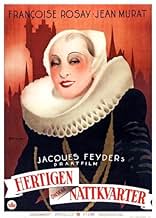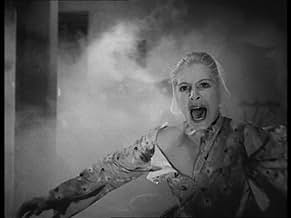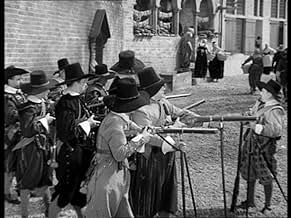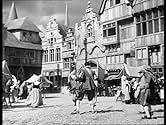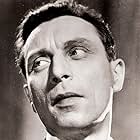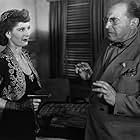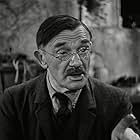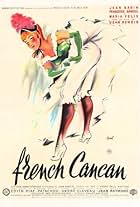IMDb RATING
7.4/10
1.4K
YOUR RATING
Tells the story of the Spanish invasion of FlandersTells the story of the Spanish invasion of FlandersTells the story of the Spanish invasion of Flanders
- Awards
- 5 wins & 1 nomination
André Alerme
- Korbus de Witte, le bourgmestre
- (as Alerme)
- …
Lyne Clevers
- La poissonnière
- (as Lynne Clevers)
- …
Arthur Devère
- Le poissonnier
- (as Arthur Devere)
- …
Alexander D'Arcy
- Le capitaine
- (as Alexandre Darcy)
- …
Claude Sainval
- Le lieutenant
- (as Claude Saint Val)
- …
Storyline
Did you know
- TriviaThe film gave rise to protests in Belgium, mainly from certain members of the Flemish community. It went as far as an interpellation at the Chamber of Deputies in order to have the film banned in Belgium. The request was rejected; nevertheless, it was banned in the city of Bruges.
- Quotes
Cornelia de Witte, Madame la Bourgmestre: If life's a bit hard at first, all the better. You're young and in love. Nothing else matters.
- ConnectionsAlternate-language version of Die klugen Frauen (1936)
Featured review
A classic of French pre-War cinema, Carnival in Flanders by the great Jacques Feyder is the most devious and cruel satire you might ever come across. Set in early 17th-century Flanders, which had previously been under Spanish rule, the story opens with shots of a busy village preparing for the yearly carnival, when the news break that the Spanish Duke Olivares and his troops plan to stay in town. At the prospect of looting and raping militia men, the flabby mayor of the well-to-do provincial nest called Boom volunteers, as he puts it, "to sacrifice" himself: his plan to pretend he has just passed away, thus hoping to convince Olivares to bypass the mourning town, is eagerly adopted by his timorous menfolk. But while the males go about staging the mock funeral, the women, led by the mayor's energetic wife, take over the action and, in turn, decide to "sacrifice" themselves to the soldiers. What follows is a grand tale of sexual libertinage and deception with a "happy end" of sorts where virtually no-one is redeemed. (The original title, La Kermesse héroïque, literally The Heroic Fête, operates in much the same way as Milos Forman's early satirical masterpiece, The Fireman's Ball, 1967, and the parallels are numerous; no doubt Forman had taken a second look at Feyder's Kermesse during his studies.) What immediately strikes one today is Feyder's directness in exposing his characters' human flaws, which is hardly subdued by the general satirical tone. The way adultery, homosexuality and eroticism but also greed, cowardice and deceit are depicted leaves one speechless at times, and certainly wondering how political correctness and all sorts of profit policies and conservatisms have infested modern-day cinema to a point it would no longer dare think to produce anything like this. Not to speak of the 1930s Hollywood counterparts, for which Feyder would have been light years off the mark, proving the point that there was and still is such a thing as the "French cultural exception". Apart from the latent debauchery creeping out into the open from the cozy interiors of a model town, the film also has multiple strings of side puns that keep its pace up at all times from spot-on character studies (the mayor, the artist, the butcher...) to hysterical history sidekicks (using a fork for the first time, Spaniards wondering what "beer" is, impious remarks on Dutch painting...). Most strikingly, it is a hallucinatory mockery of the Dutch and their supposed idiosyncrasies: avarice, Protestant pragmatism, self-righteous "middle-class" rule, bogus worldliness, you name it. This goes to such an extent that it has been repeatedly claimed that Feyder had intended an allegory of the Dutch's collaboration with the German occupier in WWI and from today's perspective, one is tempted to grant it visionary power as well, since substantial parts of the Flamish-speaking population of Belgium were eager supporters of Nazi rule. This assumption makes sense once you've witnessed the cold-blooded irreverence and unmasked sarcasm Feyder uses to unmask his species, which is surpassed only (in literature) by the untouchable Molière. Clearly, all formal issues had to serve this main objective the Vaudeville acting, the picturesque film set, the matter-of-fact filming, and not least the purpose-built dialogues. So, although you should not expect a formidably audacious experiment in film-making, you will be treated a deliciously immoral chamber piece on sexual banter and other not so politically correct behaviour. Released in 1935, it is also a cruel reminder of how conservative the world and its cultural output has become as of late.
- erniemunger
- Dec 7, 2005
- Permalink
- How long is Carnival in Flanders?Powered by Alexa
Details
- Runtime1 hour 35 minutes
- Color
- Sound mix
- Aspect ratio
- 1.37 : 1
Contribute to this page
Suggest an edit or add missing content


